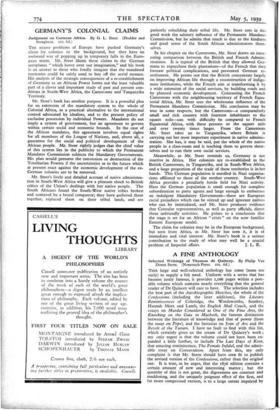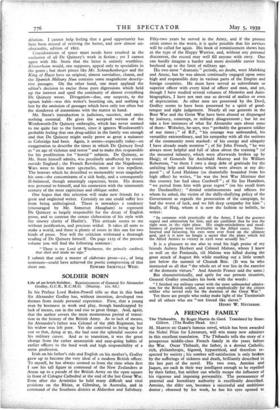A FINE ANTHOLOGY
Selected Writings of Thomas de Quincey. By Philip Van Doren Stem. (Nonesuch Press. Jos. 6d.)
THIS large and well-selected anthology has come (none too early) to supply a felt need. Uniform with a series that has become justly famous, it provides 1,166 pages within a port- able volume which contains nearly everything that the general reader of De Quincey will care to have. The selection includes the best part of the Autobiographic Sketches, the whole of the Confessions (including the later additions), the Literary Reminiscences of Coleridge, the Wordsworths, Southey, Hannah More and Lamb, the English Mail Coach, and the essays on Murder Considered as One of the Fine Arts, the Knocking on the Gate in Macbeth, the famous distinction between the literature of knowledge and that of power (from the essay on Pope), and the fantasias on Pan of Arc and the Revolt of the Tartars. I have no fault to find with this list, which certainly gives us the cream of De Quincey's work ; my only regret is that the volume could not have been ex- panded a little further, to include The Last Days of Kent, that amusing reminiscence, The Female Infidel, and the admir- able essay on Conversation. Apart from this, my only complaint is that Mr. Stern should have seen fit to publish the revised version of the Confessions, rather than the original one. It is true, as he urges, that the 1856 edition contains a certain amount of new and interesting matter ; but the quantity of this is not great, the digressions are constant and maddening, and the uniquely poignant effect of the first, and far more compressed version, is to a large extent impaired by
dilution. I cannot help feeling that a good opportunity has here been missed of reviving the better, and now almost un- obtainable, edition of 1822.
Considerations of space must needs have resulted in the exclusion of all De Quincey's work in fiction ; yet I cannot agree with Mr. Stern that the latter is entirely worthless. Klosterheim would, one supposes, appeal only to specialists in the genre ; but short pieces like Mr. Schnackenberger and the King of Hayti have an original, almost surrialiste, charm, and the Spanish Military Nun contains some magnificent descrip- tive passages. On the other hand, one must applaud the editor's decision to excise those pure digressions which held up the interest and spoil the continuity of almost everything De Quincey wrote. Divagation—due, one suspects, to the opium habit—was this writer's besetting sin, and nothing is lost by the omission of passages which have only too often but the slenderest of Connexions with the matter in hand.
Mr. Stern's introduction is judicious, succinct, and omits nothing essential. He gives the accepted version of the Wordsworth-De Quincey embroglio, which has never seemed to me quite fair to the former, since it ignores Wordsworth's probable feeling that one drug-addict in the family was enough and that De Quincey might easily prove as great a nuisance as Coleridge had been. Again, it seems—especially today—an exaggeration to describe the times in which De Quincey lived as " an age of violence and terror" and to make this responsible for his predilection for " horrid " subjects. De Quincey, as Mr. Stem himself admits, was peculiarly unaffected by events outside England ; the French Revolution and the Napoleonic Wars were to him mere spectacles, more or less repellent. The horrors which he described so memorably were singularly his own—the concomitants of a sick body, and a consequently ill-balanced, though amazingly capacious, brain. His drama was personal to himself, and his connexion with the nineteenth century of the most capricious and oblique order.
One hopes that this selection will make new friends for a great and neglected writer. Certainly no one could suffer less from being anthologised. There is nowadays a. tendency (encouraged by Mr. Somerset Maugham) to represent De Quincey as largely responsible for the decay of English prose, and to contrast the ornate elaboration of his style with the sinewy clarity of Hazlitt's. This attitude seems to me without justification, and precious withal. It takes all sorts to make a world, and there is plenty of room in this one for two kinds of prose. Nor will the criticism withstand a thorough reading of De Quincey himself. On page x125 of the present volume you will find the following sentence : " There is my Lord of Winchester, the princely cardinal, that died and made no sign."
I submit that only a master of elaborate prose—i.e., of long sentences—could have achieved the poetic compressioq of that















































 Previous page
Previous page